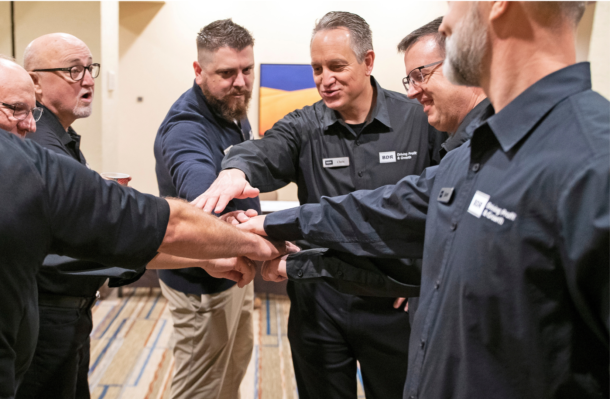The terms employee and team member have become almost interchangeable in recent years. But it’s important to understand the real difference between the two words because it’s more than just terminology.
A team reflects one kind of company culture — accountable, engaged and goal-oriented — and an employee/employer relationship represents another kind — transactional and uninspired. One of these cultures supports growth and innovation; the other leads to mediocre results and stagnation.
Which one describes your company?

Employees vs. team members
The difference between an employee and team member is subtle. But it’s a crucial distinction and essential knowledge for leaders in the skilled trade industries, where acute labor shortages keep recruiting and retention intensely competitive.
Employees
- Go to work for a paycheck.
- Do exactly what’s expected of them — but no more.
- Don’t invest their own ideas or initiative.
- Won’t positively reinforce your brand outside of work.
- Likely to frequently leave one job for another.
- Overlook details and lack accountability which can lead to major oversights.
Team members
- Recognize they are part of something bigger than themselves.
- Get paid to do what they’re passionate about.
- Foster new ideas and drive innovation.
- Serve as ambassadors for your brand with customers, friends and family.
- Create institutional continuity and act as positive role models for other team members.
- Work together toward a single goal and usually get more done in less time with fewer mistakes.
It doesn’t take long for the differences to add up. The costs to your company come in many forms, with rollbacks, dissatisfied customers, damaged reputation and missed opportunities among them. When an employee leaves your company for a $1 an hour raise across town, you’re left with the cost of hiring and training their replacement.

Building your team
When it comes to recruiting and developing team members vs. employees, it isn’t as simple as just switching out one job title for another. Team members need a team. It’s up to you to build your company with a solid mission that gives prospective team members reasons to join and stick with you. Here are some key concepts to incorporate at your company in building and transforming your team:
- Communication: This goes both ways. Keep lines of dialogue open so team members can share their ideas. It’s also important to communicate clearly with team members so they know what’s expected and what goals they’re working toward.
- Celebration: From a quick shout-out when you see small things done the right way to bonus pay, don’t let superior performance go unrecognized. Build in big incentives for motivation, take time for regular call-outs and encourage team members to cheer each other on.
- Culture: Don’t let “team” be a buzzword at your company. The people who work there know the difference, no matter what you call it. When they feel valued at work it gets passed on to customers. When they don’t feel valued, that’s passed on, too. Create an authentic team concept by intentionally investing in your team and the resources they need for success.
Put it all together
Teamwork is no longer an option for contractors. With the emergence of Generation Z and the deep economic impact of COVID-19 paired with other supply chain and labor issues, a passion and dedication for team culture is required for success in home services.
A real team is built on vision, values and mission. If you’re committed to living all those every day and being accountable, the people around you recognize it. Talk to your team, encourage them to buy in and you’ll see the difference.
 Chris Koch is Head Coach and Trainer for Business Development Resources – the premier provider of business training and coaching to home service contractors across North America.
Chris Koch is Head Coach and Trainer for Business Development Resources – the premier provider of business training and coaching to home service contractors across North America.




Join the conversation: